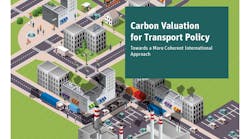International Transport Forum
Paris, Cedex 16
France
More Info on International Transport Forum
Who we are
The International Transport Forum at the OECD is an intergovernmental organisation with 54 member countries. It acts as a strategic think tank for transport policy and organises an annual summit of ministers.
What we work for
Our goal is to help shape the transport policy agenda on a global level, and ensure that it contributes to economic growth, environmental protection, social inclusion and the preservation of human life and well-being.
How we do it
The work of the International Transport Forum rests on three pillars:
- Annual summit: The International Transport Forum's annual summit is the unique platform for a global conversation on strategies for transport in the 21st century. At the summit, ministers from 54 member countries and beyond engage in focused debates with decision-makers from business, civil society leaders and top academics. The International Transport Forum 2012 focusing on the theme "Seamless Transport: Making Connections" will take place in Leipzig from 2 to 4 May 2012.
- Think Tank: The work of the International Transport Forum is underpinned by economic research, statistics collection and policy analysis. Its evidence-based insights on transport policy issues make the International Transport Forum and important think tank for policy-makers and the global transport community. Our researchers are committed to delivering impartial analysis of the highest quality. Leading academics, regulators and government economists are regularly engaged in debate in the Research Centre's roundtables on critical issues for transport policy. The Research Centre also maintains a range of statistics and indicators on transport, as well as specialised databases.
- Intergovernmental Organisation: 54 member countries have joined forces in the International Transport Forum to advance transport policy. The roots of the organisation lie in the European Conference of Ministers of Transport (ECMT), which met until 2007, when the scope and geographic reach was widened and the format emerged as the International Transport Forum. The International Transport Forum continues to manage the ECMT's system of Multilateral Licences for international road haulage on the European continent.
Our History
The International Transport Forum evolved from the European Conference of Ministers of Transport (ECMT) in 2006/7. At the time, ministers decided to invite new members from non-European countries in order to address transport issues on a global level and for all transport modes, and to create a public platform for a broad policy dialogue.
The ECMT was established by a protocolOur Structure
The International Transport Forum is designed to be a flexible, efficient and politically responsible institution.
- Secretariat: The International Transport Forum's secretariat is based at the OECD in Paris (France). It is led by theSecretary General. The secretariat comprises the Research Centre, the Policy and Summit Preparation Unit, the Communications Unit and the Management Support Unit.
- Presidency: The Presidency of the International Transport Forum revolves annually among member countries. The Presidency chairs Transport Management Board meetings and has a leading role in organising the annual summit taking place during its tenure.
- Transport Management Board: The Transport Management Board (TMB) gives direction to the work of the Forum. It consists of the representatives of the member countries and meets at least twice per year. The TMB is chaired by the Presidency country.
- Task Force: To help the Presidency plan the annual summit, a small Task Force is formed from TMB members. In preparing the summit, the Task Force also may draw upon the Research Centre, special ad hoc projects groups and policy networks, as well as on consultations with stakeholders.
- Research Centre: In January 2004, the ECMT and the OECD brought together their transport research capabilities, setting up the Joint Transport Research Centre. The Research Centre provides input for the annual summit and organises longer-term research projects under the oversight of member countries' transport ministries and research agencies through the Joint Transport Research Committee. Much of the work is undertaken by experts from these agencies working collaboratively to report on the latest results of policy-relevant research.
- Advisory Board: The Advisory Board is the International Transport Forum's principal mechanism of high-level consultation with the transport community. The Board provides guidance on general strategy and interaction with the private sector. The Advisory Board is composed of a limited number of high level individuals drawn from industry, civil society, the academic and research sectors. They are selected on the basis of their personal abilities and support for the broad aims of the Forum. As of 1 October 2009, the International Transport Forum's Advisory Board consists of:
- Paolo COSTA, President, Venice Port Authority, Italy;
- Jean-Luc DI PAOLA-GALLONI, Corporate Vice-President, Sustainable Development and External Affairs, Valeo Group
- Enrique DIAZ-RATO, CEO, Cintra, Spain;
- Lord MACDONALD of Tradeston, Senior Advisor, Macquarie Infrastructure and Real Assets;
- Claude MANDIL, Former Executive Director, International Energy Agency;
- Patrick OLIVA, Group Vice-President, Prospective& Sustainable Development, Michelin, France;
- Ron WIDDOWS, Senior Advisor, Neptune Orient Lines, Singapore;
- Mitsuhiko YAMASHITA, Executive Vice President, Nissan, Japan.

